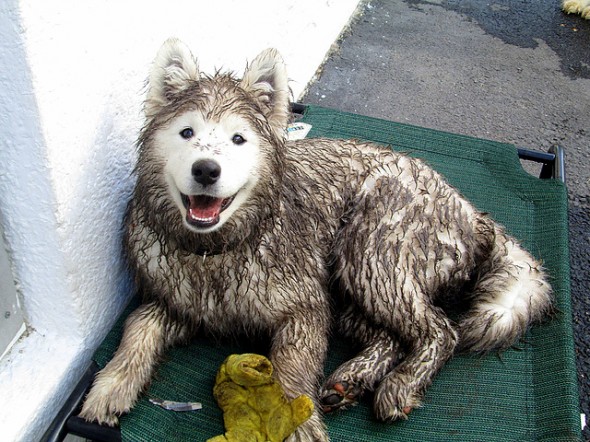Recently I dog sat Homer, my roommate’s yellow lab. He’s lovably bad, and our week together resulted in a highlight reel of endearing vignettes: Homer wagging happily as I walked through a urine-soaked patch of carpet (in fresh socks!); Homer lick-tackling my face as I bent over to scoop his poop; Homer bounding so enthusiastically into the dog park that he started a four-hound brawl. But the strongest memory came from our trip to the beach, because since then, every time I open my car door I get hit with the wet-dog smell he left behind.
My now-daily blast of stench also got me wondering about the origin of Homer’s soggy aroma. Like most dogs, he’s normally a little musty, but what is it about water that transforms his faint musk into a pungent fog of funk?
First, a quick background on smell. When you inhale, microscopic airborne molecules alight upon specialized cells—called olfactory sensory neurons—deep in your nasal cavity. These cells translate the chemical signature from the molecules into an electrical signal, which gets sent along to your brain. There, it triggers the circuits that help you put a label to the smell: Bacon! New Book! Wet dog!
Homer, as you can see below, looks so happy and adorable that you’d never guess he’s crawling with musk-emitting microorganisms.
But those little buggers are the real source of the stink that he rubbed all over my upholstery. More specifically, the smell comes from the excrement of bacteria and yeasts living in his fur.
So what’s water got to do with it? When dry, these microscopic pieces of dung don’t emit a scent. H20 breaks down the chemical bonds that hold the micro-excreta together, releasing a fog of musty molecules into the air. As water evaporates it also raises the relative humidity in the air surrounding your dog. Humid air can hold more molecules (warm air does this too, and together heat and humidity can have a compounding effect on smell), and the higher concentration of molecules in the air means more can make their way into your nasal cavity to assault your olfactory receptor neurons.
And even though it’s been too chilly to drive with my windows down and air my car out, I don’t mind Homer’s lingering brand. In fact, I’ve actually learned to like it. I’ve also learned to put shoes on over my socks before I venture out onto the carpet.


